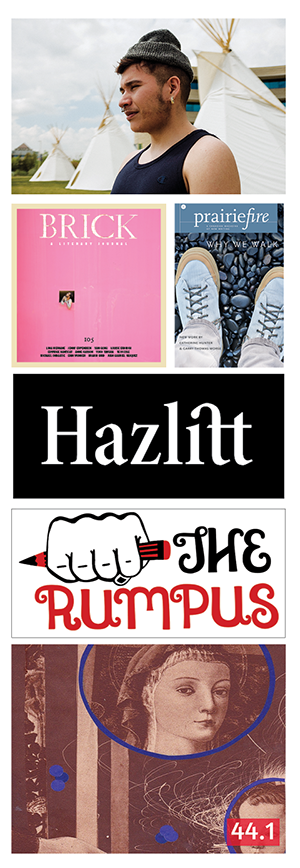In his third book, A History of My Brief Body (Two Dollar Radio, July 2020), Billy-Ray Belcourt says he “marshals the forces of poetry and theory to create a kind of memoir that stretches well beyond the boundaries of my individual life.” The poetic and probing essay collection shuttles between personal reflection, critical race theory, and commentary on poetics, colonialism, queerness, loneliness, and utopia, among other topics. Belcourt, who is from the Driftpile Cree Nation, says he aims to write “into a narrative of joy that troubles the horrid fiction of race that stalks me.” Also a poet—he won the prestigious Griffin Poetry Prize for a Canadian writer for his debut collection, This Wound Is a World (Frontenac House, 2017)—Belcourt has published his poems and essays in many journals, including the five below.

Top: Billy-Ray Belcourt (Credit: Tenille Campbell)
Belcourt, who grew up in Joussard, Alberta, and teaches at the University of British Columbia, calls Hazlitt “one of the giants of online literary publishing in Canada.” Part of Penguin Random House Canada, the magazine publishes fiction, essays, humor pieces, journalism, investigative features, and profiles. “The [editors] trouble notions of what is and isn’t publishable,” says Belcourt, whose “Fatal Naming Rituals,” which he describes as a work of criticism with a poetic bent, was published by Hazlitt in July 2018. The magazine has featured the work of writers on topics such as street preachers in Las Vegas and the film roles of Winona Ryder; the editors state that a good Hazlitt piece features evocative writing, scenes and characters, a turn or surprise, a strong through-line, and solid research. “Even the most personal of essays shouldn’t be entirely insular,” the editors write. “Nothing happens in a vacuum, and context and awareness of the world around you is critical.” Submissions are currently closed.
“Some days, the act of writing isn’t so much holding a mirror to oneself but to a future grave,” writes Belcourt in his essay “Notes From an Archive of Injuries,” in which he considers what it means to write. The essay comes from a longer lecture Belcourt delivered at the League of Canadian Poets’ annual conference in 2019 and was published in Prairie Fire. “I also come from the prairies so was delighted to publish in a magazine that moves the center to the prairies,” says Belcourt of the print quarterly, which is edited in Winnipeg and publishes poetry, fiction, and creative nonfiction. In December writer Carolyn Gray started as the journal’s new editor; since then Gray and the other editors released an issue carrying the theme “Why We Walk” and put out a call for submissions in all genres about “living in a house on fire”—or “living in our current time of tremendous uncertainty” as it relates to climate change and COVID-19. General submissions are open via e-mail until June 30.
When Belcourt started submitting to journals, he focused on those with Indigenous writers on their boards or that had special issues on Indigenous or queer writing. “I understood that my poems needed a particular kind of interpretive context if they were to breach the larger, more corrupt interpretive context of colonial modernity,” he says. He found one such publication in the Rumpus, which published his poem “ndn Brothers” in a series on Indigenous poets edited by Tanaya Winder. In addition to publishing, as Belcourt says, “dazzling poetry year-round,” the Rumpus features fiction, essays, comics, criticism, and interviews. The editors also run columns devoted to writing about addiction and writing by women and nonbinary people about rape culture, sexual assault, and domestic violence. Poetry submissions are open from July 15 to July 31, fiction submissions during the month of July, and essay submissions until the end of July.
After Belcourt read at the Ohio State University (OSU), the graduate students who edit the Journal requested a poem from him and eventually published “Bad Lover” in the Fall 2019 issue along with poetry by Saddiq Dzukogi, fiction by Laura O’Gorman Schwartz, and nonfiction by Emily O’Neill. The quarterly, which is published twice a year in print and twice a year online, features poetry, fiction, and nonfiction, as well as interviews and book reviews. Since OSU has closed its campus and switched to remote learning, the journal is currently not accepting submissions.
Belcourt was delighted to receive a request to submit a poem from the editors of Brick, a collective comprising Dionne Brand, Madeleine Thien, and six other major Canadian writers. Released twice a year out of Toronto, Brick primarily publishes nonfiction, although the editors admit “a willingness to stray when our hearts are taken.” Established in 1977 by Stan Dragland and Jean McKay and edited by Michael Ondaatje from 1985 to 2013, Brick has published writers such as John Berger, Louise Erdrich, and Zadie Smith. Nonfiction submissions open via Submittable on September 1; the editors do not accept submissions in poetry or fiction.
Dana Isokawa is the senior editor of Poets & Writers Magazine.








